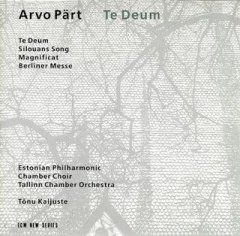Arvo Part - Te Deum, Silouans Song, Magnificat, Berliner Messe (1993)
Arvo Part - Te Deum, Silouans Song, Magnificat, Berliner Messe (1993)

1. Te Deum 2. Silouans Song 3. Magnificat 4. Berliner Messe: Kyrie 5. Berliner Messe: Gloria 6. Berliner Messe: Erster Alleluiavers 7. Berliner Messe: Zweiter Alleluiavers 8. Berliner Messe: Veni Sancte Spiritus 9. Berliner Messe: Credo 10. Berliner Messe: Sanctus 11. Berliner Messe: Agnus Dei Estonian Philharmonic Chamber Choir Tallin Chamber Orchestra Tonu Kaijuste - director
Pärt's Berliner Messe can lay some claim to being the composer's finest work - at the very least, it provides yet more evidence that Pärt should be recognized as a great composer. Stylistically all the works on this disc exhibit the hallmarks of the composer's "tintinnabulistic" style - plainchant-like melodies centered around a tone (and triadic harmonies based around the tone), mildly dissonant and pared down often to an absolute minimum with respect to ornaments, yet with masterly woven textures, and often being thoroughly mesmerizing and easily able to sustain the listener's complete attention. The most extreme example on this disc is in fact the substantial Te Deum for choir, strings, and prepared piano; not a work for newcomers to the composer, to be sure, but exquisite, hypnotically beautiful and actually ingeniously variegated in its austerity.
As for the shorter works, Silouans Song is a five-and-a-half minute piece for strings, and not among Pärt's stronger works - the basic idea is not particularly strong, and when subjected to Pärt's spare treatment it is rather crucial that the basic idea is a good one; indeed, the main danger of Pärt's approach (a danger he generally avoids) is that the music sounds samey, and in the case of Silouans Song the problem is exactly that it sounds like most of his other recent works, only less compelling. The a cappella Magnificat, however, is superb. Lasting for six minutes as well, it is a shimmeringly beautiful piece that also must be excrutiatingly difficult to perform - the slow lines pose severe challenges to the chorus, who is required to maintain the pitch throughout. But the Estonian Philharmonic Chamber Choir manages apparently without effort (a spectacular achievment, really).
The Berliner Messe (commissioned for the Ninetieth Catholic Church Convention in Berlin) is magical. It gives the illusion of being more active than, say, the Te Deum, but the effect is nevertheless achieved through minimal means; the effect is deeply luminous, shimmering, otherworldly and breathtaking (sample, for instance, the marvelous Veni Sancte Spiritus, where the melodic lines are woven around a constant tone, the heavenly, angelic Sanctus, or the mesmerizing Agnus Dei, with its conversation between sopranos and tenors and gradual softening and darkening of the luminescent textures to an almost dreamlike conclusion). The Berliner Messe is not only a masterpiece, but a work that could achieve real popular success - along the lines of Gorecki's third symphony (the effect is in many ways similar) - if given a chance.
As mentioned the performances are scintillating. It is impossible to come up with anything but praise for the almost unbelievably marvelous singing of the Estonian Philharmonic Chamber Choir. The Tallinn Chamber Orchestra plays beautifully as well, and Tönu Kaljuste directs his forces with sensitivity and understanding. No less excellent is ECM's presentation, and the recorded sound - rich, shimmering, but clear and well-balanced - is demonstration class. Recommended with enthusiasm, and the Berliner Messe in particular is recommended even to those who don't usually consider themselves particular fans of the composer. ---G.D., amazon.com
download (mp3 @320 kbs):
yandex mediafire mega uloz.to 4shared cloudmailru gett hostuje
Zmieniony (Niedziela, 01 Październik 2017 08:43)








